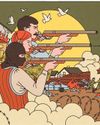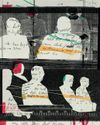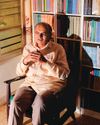
Amir’s house, in Wahat al-Salam/Neve Shalom, an intentional community of Jewish Israeli and Palestinian Israeli families, is made of stone, chic but spare, not showy. A covered porch faces west, looking out at the green expanse of the Ayalon Valley. Amir, who is Palestinian, first moved to Wahat al-Salam/Neve Shalom thirty-five years ago, when he was four. His family had been living in East Jerusalem and wanted to escape the violence of the first intifada. The village school, which goes from nursery through sixth grade, is fully bilingual, with equal hours of instruction in Arabic and Hebrew. When Amir speaks Hebrew, Jewish Israelis have a hard time believing that he is Arab, and they often say so, thinking it’s a compliment.
Wahat al-Salam/Neve Shalom—which means Oasis of Peace, in Arabic and Hebrew—was founded by Bruno Hussar, an Egyptian-born Jew who fled the Nazi invasion of France and later became a Dominican priest. Around 1970, he secured a large parcel of land, on loan from a Trappist monastery, to attempt an experiment in nonmilitarism and religious pluralism in the middle of Israel, halfway between Jerusalem and Tel Aviv. This was the age of encounter groups, gatherings based on a belief in the total power of dialogue, and Hussar envisioned Wahat al-Salam/Neve Shalom as a permanent encounter. By the time Amir’s family arrived, the community had widened its efforts by establishing the School for Peace, a training center for activists, academics, and civil servants. Some eighty thousand people have completed the School for Peace’s courses, which aim to turn citizens of Israel, both Palestinian and Jewish, into agents of change.
Esta historia es de la edición June 17, 2024 de The New Yorker.
Comience su prueba gratuita de Magzter GOLD de 7 días para acceder a miles de historias premium seleccionadas y a más de 9,000 revistas y periódicos.
Ya eres suscriptor ? Conectar
Esta historia es de la edición June 17, 2024 de The New Yorker.
Comience su prueba gratuita de Magzter GOLD de 7 días para acceder a miles de historias premium seleccionadas y a más de 9,000 revistas y periódicos.
Ya eres suscriptor? Conectar

GET IT TOGETHER
In the beginning was the mob, and the mob was bad. In Gibbon’s 1776 “Decline and Fall of the Roman Empire,” the Roman mob makes regular appearances, usually at the instigation of a demagogue, loudly demanding to be placated with free food and entertainment (“bread and circuses”), and, though they don’t get to rule, they sometimes get to choose who will.

GAINING CONTROL
The frenemies who fought to bring contraception to this country.

REBELS WITH A CAUSE
In the new FX/Hulu series “Say Nothing,” life as an armed revolutionary during the Troubles has—at least at first—an air of glamour.

AGAINST THE CURRENT
\"Give Me Carmelita Tropicana!,\" at Soho Rep, and \"Gatz,\" at the Public.

METAMORPHOSIS
The director Marielle Heller explores the feral side of child rearing.

THE BIG SPIN
A district attorney's office investigates how its prosecutors picked death-penalty juries.

THIS ELECTION JUST PROVES WHAT I ALREADY BELIEVED
I hate to say I told you so, but here we are. Kamala Harris’s loss will go down in history as a catastrophe that could have easily been avoided if more people had thought whatever I happen to think.

HOLD YOUR TONGUE
Can the world's most populous country protect its languages?

A LONG WAY HOME
Ordinarily, I hate staying at someone's house, but when Hugh and I visited his friend Mary in Maine we had no other choice.

YULE RULES
“Christmas Eve in Miller’s Point.”